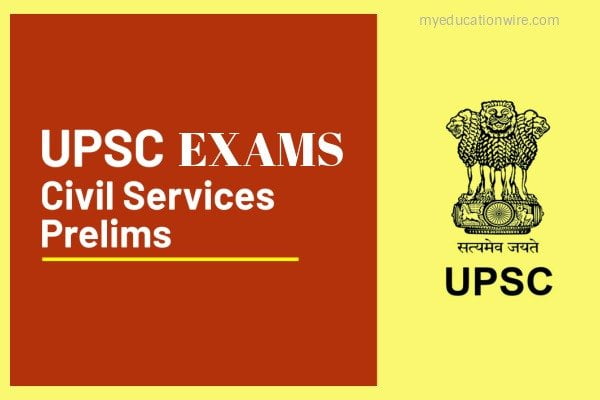Due to the unexpected nature of the exams and difficulty level, students find it difficult to crack through. But, with the detailed guide and process, we have here, we will help you guide through the process to make this difficult process a little easier and help you crack the exams.
Also Read :- UPSC Civil Services Exam 2025
The Three Phases

All the civil services exams are divided into three stages: the Preliminary, Main Exam and the Interview. The UPSC exam calendar 2021 has already been released on August 17, 2020, and it has all the notifications for the latest updates for IAS exam 2021, UPSC CMS exam 2021, UPSC CAPF Exam 2021, Engineering Services Exam (IES) 2021, NDA Exam 2021, CDS Exam 2021 and other exams. You can find the details here.
The UPSC exams are conducted in English and Hindi language.
Exam Eligibility
The minimum exam eligibility is to have a Bachelor’s degree to appear for this exam. The notification for the exams. For the General Category students, the age limit is 21-32 years with a maximum of 6 attempts.
UPSC Syllabus
The various exams that fall under UPSC have different syllabi.
UPSC Prelims
Exam Pattern :
General Studies Paper I (200 marks, 2 hours)
- Current events are of national and international importance.
- History of India & Indian National Movement.
- Indian Geography, World Geography: Physical, Social, Economic Geography of India and the World.
- Indian Polity & Governance – Constitution, Political System, Panchayati Raj, Public Policy, Rights Issues, etc.
- Economic and Social Development – Sustainable Development, Poverty, Inclusion, Demographics, Social Sector Initiatives, etc.
- General issues on Environmental Ecology, Biodiversity and Climate Change – that do not require subject specialization
General Science
- CSAT or General Studies Paper-II (200 marks, 2 hours)
- Comprehension
- Interpersonal skills including communication skills
- Logical reasoning & analytical ability
- Decision-making & problem solving
- General mental ability
- Basic numeracy of Class X level (numbers and their relations, orders of magnitude)
- Data interpretation of Class X level (charts, graphs, tables, data sufficiency)
- UPSC Mains
Exam Pattern :
They are divided into two categories: 2 Qualifying papers & 7 papers to be counted for merit.
| Qualifying Papers | Marks | |
| Paper-A | One Indian Language to be selected by the candidate from all the Languages included in the Eighth Schedule to the Constitution: Assamese, Bengali, Bodo, Dogri, Gujarati, Hindi, Kannada, Kashmiri, Konkani, Maithili, Malayalam, Manipuri, Marathi, Nepali, Odia, Punjabi, Sanskrit, Santhali, Sindhi, Tamil, Telugu, Urdu and English. | 300 |
| Paper-B | English | 300 |
| Paper 1 | Essay | 250 |
| Paper 2 | General Studies-I (Indian Heritage and Culture, History and Geography of the World and Society) | 250 |
| Paper 3 | General Studies-II (Governance, Constitution, Polity, Social Justice and International relations) | 250 |
| Paper 4 | General Studies-III (Technology, Economic Development, Biodiversity, Environment, Security and Disaster Management) | 250 |
| Paper 5 | General Studies-IV (Ethics, Integrity and Aptitude) | 250 |
| Paper 6 | Optional Subject – Paper 1 | 250 |
| Paper 7 | Optional Subject – Paper 1 | 250 |
| Personality Test | 275 |
Total: 2025 marks
Admit Card
You can download the admit card from the UPSC website, 3 weeks before it. It is released online only.
Application Fees
Candidates applying for UPSC 2020 have to pay Rs. 100/ as the application fee. Candidates who belong to SC/ST/PH categories and female candidates are exempted from the application fee. Payment can be made through online or offline mode.
What happens after the results are released?
The process doesn’t end after the results are announced. After you get qualified after passing the exams, the UPSC committee sends the list of candidates to the respective ministry to conduct interviews.
Preparing for the exams
You should start preparing for the exams well in advance to crack the civil services exams. UPSC exams have a wide syllabus which cannot be covered in a short time. We have some quick tips which can make it possible for you to qualify for this exam.
- Make a note of your strong and weak subjects.
There are many subjects that you can prepare for, and everyone can have strong subjects and weak subjects. While creating a plan, make sure you allow sufficient time to each subject and plan more time for the subjects you are weak in.
Concentrating on the weak subjects in more time will make you prepared for it, and after completely preparing for it, you can jump to the strong subjects, and this will make you ready for the exams.
- Make a plan and distribute the subjects accordingly.
You should make a plan that helps you complete the whole syllabus on time as well as have enough time for revision. Complete the course in advance to revise it well. If your revision is thoroughly done, it will give you the confidence to appear for the preliminary and the main exam too.
- It is a gradual process.
This is a little hard to understand, but preparing for UPSC is not work for a month, or a few months, it is a slow and steady process for which you need to be mentally prepared. For efficient preparation, you must keep yourself updated with the current trends, and read magazines, and newspapers for current affairs.
For the mains exam, you need to select a subject out of the 48 subjects. The optional subject has two papers in the main exam, and you should select that depending on your interest in the subject and your grip on it.
- Collect the right material and solve the previous year’s papers
The right material is the key to deciding your level of preparation. Always take help from previous aspirants’ experiences, their suggestions and try to follow the steps they embarked on. Always ask experts in the same field, seniors, so that they can guide you through the process in it. Along with hard work, smart work is essential to complete the course and be exam-ready.
Solving mock tests and previous years’ papers give you confidence which helps a lot for the exams. Solving papers is also useful when you don’t have much time for preparation, it will help in knowing the present status, and you can focus particularly on that to appear for the exam.
- Personality and communication skills are necessary.
After you are done with the written exams, you should get prepared for the interviews. Confidence is the key to getting a good score for the interviews. You never know who may be evaluating you and what they might ask. But, having confidence in yourself reflects the positive vibe, that the interviewer would come to know, and this would pave a path to your future.
- Never get confused
In the end, it is an exam that everybody appears for. Confusion and doubts would always be there, as everyone is not a genius. But, you should never deter away from the positive thinking you have or panic if you don’t know the answer. If such a situation occurs, try to stay calm and skip the question for that moment.
After solving the other questions, you can work on it in the time you have left. Panicking and worrying would only result in more confusion, and you may lose your focus on the exam.
Preparation tips
- Always be updated with current affairs.
- Make notes to revise smartly.
- Collect study material after proper references.
- Read the short informative snippets in the ref books and textbooks.
- Take mock tests to improve preparation.
- Focus on communication skills.
- Face the interview with honesty.
- Try to stay motivated and positive.
Exam Day Tips to Remember
- Take the printouts of your hall tickets to avoid unnecessary delays.
- Take a good night’s sleep and eat healthily.
- If the exam is in another city, reach out in advance to reach the exam at the right time.
- Don’t read anything new, or it might confuse you.
- Keep yourself updated with UPSC notifications for any change.
- Be confident and try to stay focused.
What do Toppers say?
- Kanishak Kataria (IAS Topper 2019 Rank 1)
His Tips :
- Maintain Internal motivation.
- Focus on preparation strategy.
- Be selective about selecting the optional subject.
- Maintain full-concentration.
- Focus on time management.
- Revision is important.
2. Rushikesh Singareddy(UPSC CSE-2019 with an AIR-95)
He presently works in Indian Railway Traffic Service (IRTS).
His Tips :
- Notes from previous toppers.
- Revised the notes thoroughly before the exam.
3 . Laxman Tiwari (Rank 176 CSE- 2018)
His Tips :
- Previous year’s papers.
- Increase conceptual understanding.
- Pay great attention to Current affairs.
- Focus on Revision
- Start solving test papers after acquiring basic knowledge.
- Use common sense, and some questions can be solved in lesser time than required.
- Give at least 3 months for prelim exams.
Conclusion
UPSC exams have always been a great deal in our country and will continue to be due to the difficulty level it has and the results of it. With a solid plan in your mind and unnerving confidence, you would be able to pass the exam to start a bright future as you want. Follow the instructions as mentioned on the UPSC website to apply with the required details and start preparing.
